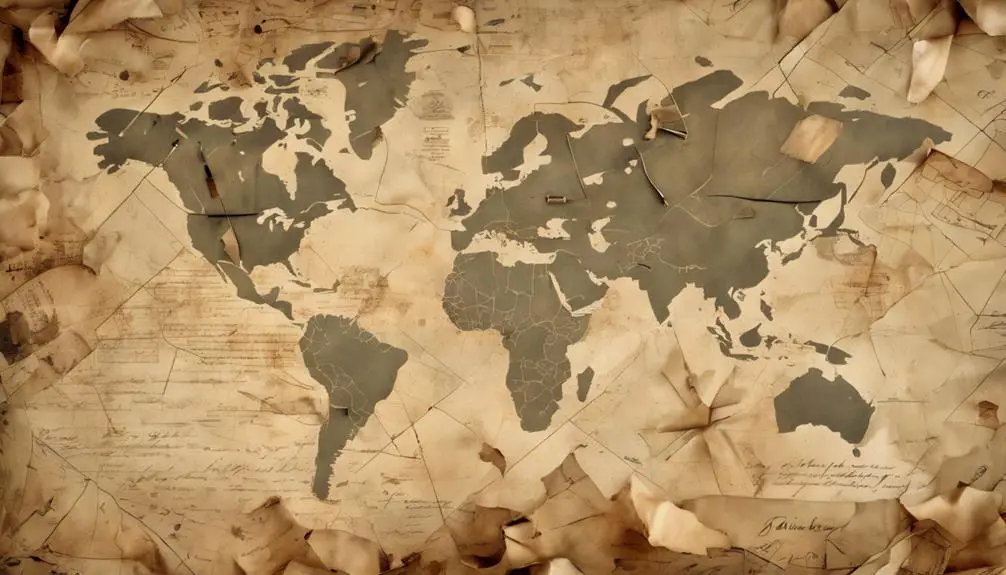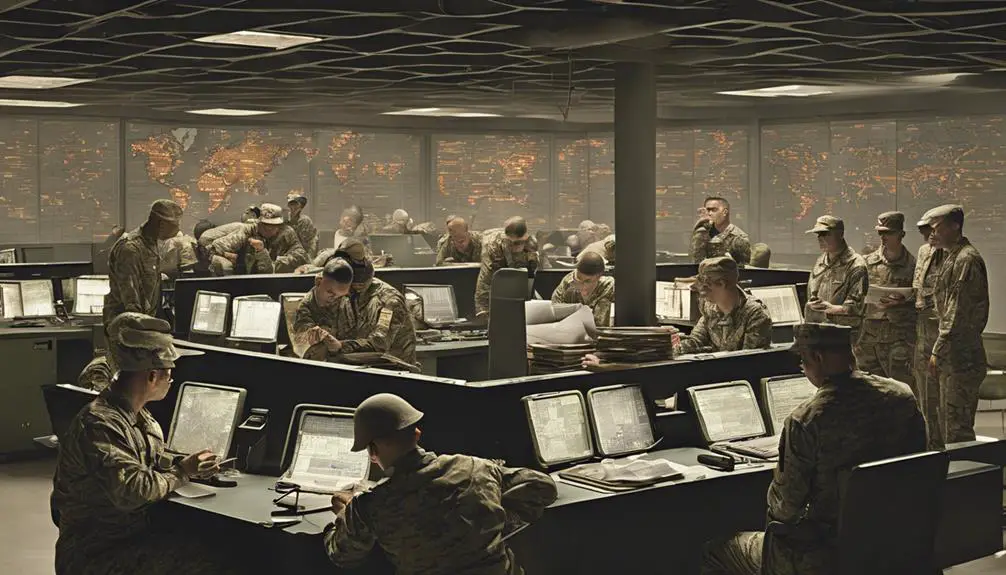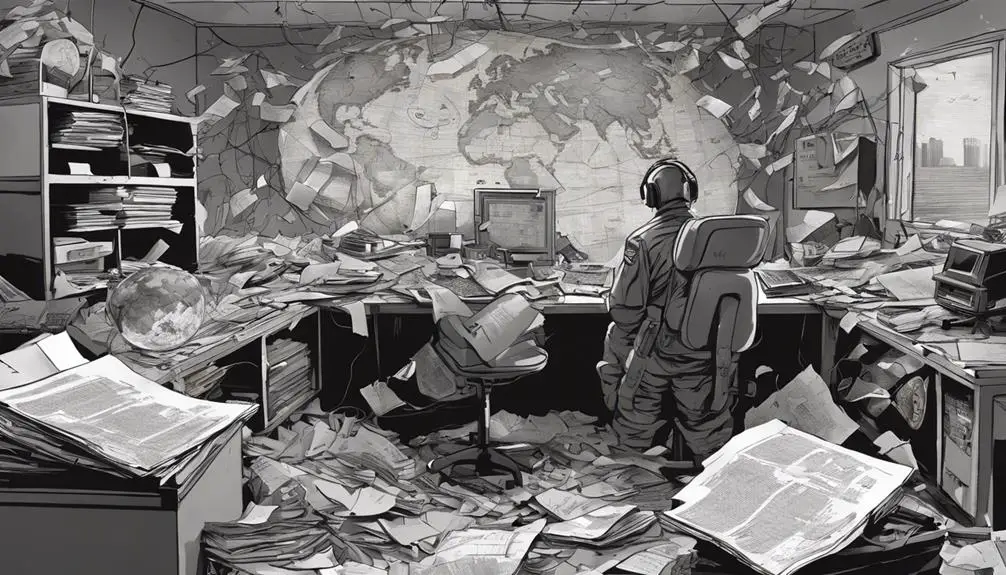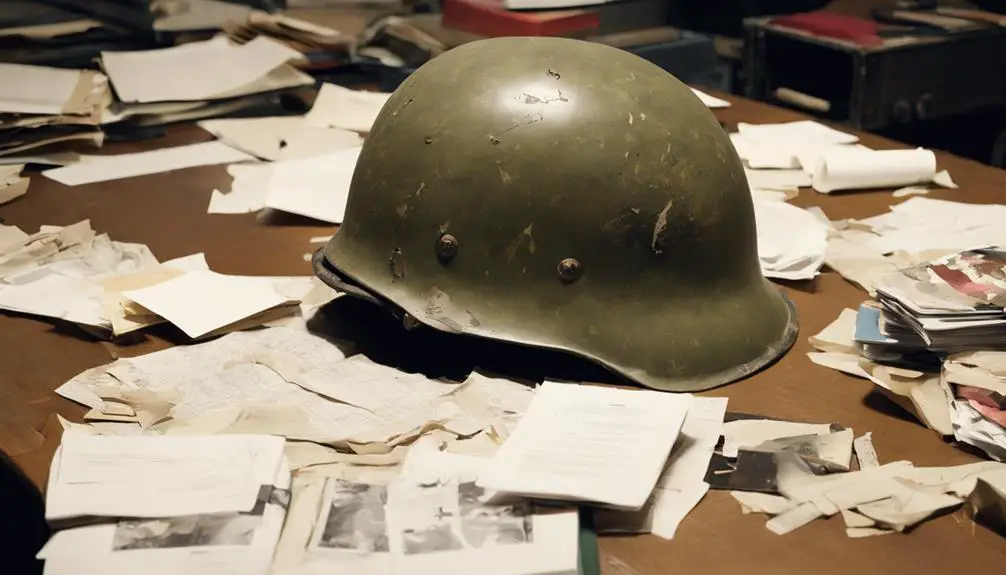As you explore military communication, you'll come across the cryptic term 'chaff', which originated as a codename for a radar-countermeasure project during World War II, revolutionizing electronic warfare. Chaff's etymology traces back to separating grain from chaff in agriculture, and its development gave the Allies a decisive advantage in the war. Today, chaff remains a critical component of electronic warfare, used to disrupt enemy radar systems and create decoy targets. You're likely wondering how to navigate the nuances of chaff terminology – and understanding its complexities can give you a deeper appreciation of military operations, so take a closer look.
Origins of Chaff Slang

When you explore the history of military slang, you'll find that the term 'chaff' originated in the 1940s, during World War II, as a codename for a secret radar-countermeasure project. This project, known as 'Window,' involved dropping aluminum strips from aircraft to confuse enemy radar systems.
The etymological roots of the term 'chaff' can be traced back to the agricultural practice of separating grain from chaff, or the worthless byproducts. In this case, the codename 'chaff' referred to the strips of aluminum, which were basically worthless pieces of metal, but served a critical purpose in disrupting enemy radar.
In its historical setting, the development of chaff as a radar-countermeasure was a significant innovation in electronic warfare. The Allies' ability to disrupt Axis powers' radar systems gave them a decisive advantage in the war.
The term 'chaff' has since become synonymous with electronic countermeasures, and its etymological roots serve as a reminder of the creative and resourceful nature of military innovation. As you explore further into the world of military slang, you'll discover how the term 'chaff' has evolved to encompass a range of meanings, but its origins remain grounded in the historical context of World War II.
Common Chaff Terms Explained
As you explore the world of military slang, you'll come across various terms related to chaff, including 'chaff corridor,' 'chaff clouds,' and 'chaff dispersal,' each with its significant meaning and application in electronic warfare. Understanding these terms is vital to grasping the concept of chaff in military communications.
| Term | Definition | Application |
|---|---|---|
| Chaff Corridor | A protected air corridor | Safeguards safe passage for military aircraft |
| Chaff Clouds | A cloud of radar-confusing chaff | Disrupts enemy radar signals |
| Chaff Dispersal | The intentional release of chaff | Interferes with enemy radar systems |
The etymology of chaff dates back to World War II, when the British and American military used chaff to confuse enemy radar systems. Today, chaff remains a critical component of electronic warfare. However, the overuse of chaff-related terms can lead to military clichés, making it essential to understand the nuances of each term. By familiarizing yourself with common chaff terms, you'll gain a deeper appreciation for the complexities of military communication.
Decoding Military Jargon

You've likely encountered military jargon that sounds like a foreign language, with terms like 'situational awareness' and 'command and control' being thrown around like they're everyday conversation. As you begin your journey into the world of military terminology, you'll realize that understanding these terms is vital to deciphering the code of military communication. Code breakers, both military personnel and civilians, must navigate this complex web of terminology to stay informed and effective.
To decode military jargon, it's important to recognize that each term serves a specific purpose. For instance, 'situational awareness' refers to the ability to comprehend and respond to a dynamic environment, while 'command and control' describes the process of directing and coordinating military operations. By grasping the definitions and context of these terms, you'll become proficient in the language of the military.
As you continue on your journey through military terminology, remember that understanding military slang isn't just about speaking the language – it's about being able to think and act like a military professional. By becoming proficient in military jargon, you'll gain a deeper appreciation for the complexity and nuances of military operations.
Chaff in Modern Warfare
In modern warfare, chaff, a type of electronic countermeasure, plays a significant role in disrupting enemy radar systems, allowing military forces to gain a strategic advantage in the skies.
As you explore the world of electronic warfare, you'll realize that chaff is an essential component of radar countermeasures. By deploying chaff, military forces can saturate enemy radar frequencies, making it difficult for them to track friendly aircraft or detect incoming missiles.
Here are some key aspects of chaff in modern warfare:
- Saturation: Chaff can overwhelm enemy radar systems, making it difficult to distinguish between real and false targets.
- Decoying: Chaff can be used to create decoy targets, diverting enemy attention away from real targets.
- Escaping: Chaff can provide a window of opportunity for aircraft to escape or evade enemy radar detection.
Lost in Translation

Chaff's effectiveness in modern warfare is overshadowed by its confusing terminology, which often leaves military personnel and civilians alike struggling to decipher its meanings.
As you explore further into the world of chaff, you'll realize that the language barrier is a significant obstacle. You might find yourself lost in translation, trying to grasp the cultural nuances behind the slang.
The use of colloquialisms, acronyms, and jargon specific to the military community can create a rift between those who are 'in the know' and those who are not. It's not uncommon for even seasoned military personnel to stumble upon unfamiliar terms, let alone civilians.
Language barriers can hinder effective communication, leading to misunderstandings and misinterpretations.
When dealing with chaff, it's important to acknowledge the cultural nuances that shape its terminology. You must be aware of the context in which these terms are used, taking into account the cultural background and experience of the individuals involved.
Frequently Asked Questions
Is Chaff Slang Exclusive to the Military?
You might wonder, is 'chaff' slang exclusive to the military? To answer this, let's explore its origins.
'Chaff' has military origins, emerging from radar-jamming technology used during World War II. In this historical context, the term referred to the aluminum strips dropped to confuse enemy radar.
Over time, the term's usage expanded, but its roots remain tied to military innovations. So, while 'chaff' has broader applications now, its slang origins are indeed deeply rooted in the military.
Can Civilians Use Chaff Slang in Everyday Conversations?
You can definitely use slang in everyday conversations, but it's crucial to take into account social norms and language evolution.
As language constantly evolves, slang terms can become mainstream, losing their original exclusivity.
If you're familiar with chaff slang, you can incorporate it into your conversations, but be mindful of your audience and context.
Using slang appropriately can add flavor to your language, but be respectful of its origins and avoid appropriation.
Is Chaff Slang Used in Formal Military Communications?
Imagine you're a radio operator on a mission, and suddenly, static fills your headset. You're not just dealing with interference; you're fighting to stay secure.
When it comes to formal military communications, you won't find chaff slang in secure transmissions or radio protocols. It's all about clarity and precision. In high-stakes situations, military personnel rely on standardized language to guarantee swift, accurate communication.
Chaff slang may be casual, but in formal comms, it's all about being crystal clear.
Do Other Countries Use Similar Military Slang?
You're wondering if other countries use similar military slang.
In the domain of cross-cultural comparisons, it's fascinating to explore international dialects. Military jargon often reflects local nuances, adapted for specific operational contexts.
While some phrases might be universally understood, others are unique to a country's language and cultural heritage.
You'll find that military slang varies greatly across nations, reflecting diverse historical, social, and linguistic influences.
Can Chaff Slang Be Used in Formal Writing?
You're about to start on a delicate juggling act, like a tightrope walker maneuvering a high-wire act.
When it comes to using slang in formal writing, you'll need to strike a balance between maintaining a professional tone and injecting creative expression.
Be cautious not to compromise the formal tone, as slang can quickly dilute the gravity of your message.
Set limits on your creative expression to guarantee your writing remains clear, concise, and respectful of your audience.
Conclusion
As you explore deeper into the world of military slang, the fog of confusion lifts, revealing a complex web of codes and colloquialisms.
Like a cryptographer deciphering ancient runes, you've cracked the code of 'chaff,' unraveling the tangled threads of military jargon.
Now, as you emerge from the linguistic fog of war, the once-indecipherable chatter of the military elite becomes a symphony of clarity, its rhythms and cadences a proof of the power of understanding.







